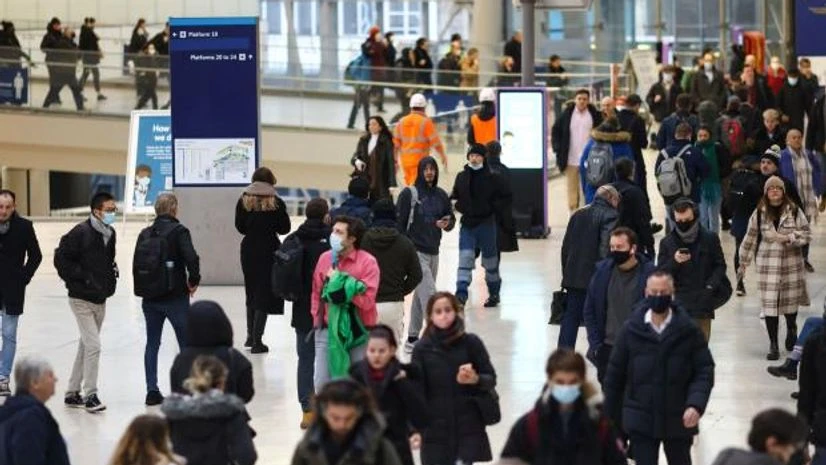Britain's main nurses' union warned Monday that exhaustion and surging coronavirus cases among medical staff are pushing them to breaking point, adding to pressure on the government for new restrictions to bring down record-high infection numbers driven by the omicron variant.
Patricia Marquis, England director for the Royal College of Nursing union, said the situation over the next few weeks looked very bleak, as growing absences from sickness and self-isolation hit hospitals struggling to clear a backlog of postponed procedures and treat normal winter sicknesses alongside coronavirus cases.
In many places they're already under immense stress and pressure, and so they are starting to go off sick themselves with COVID, but also mental and physical exhaustion, she told the BBC. So, staff are looking forward now thinking, Oh my goodness, what is coming?'"
Having repeatedly promised that there will be no repeat of last year's lockdown-marred Christmas, Prime Minister Boris Johnson faces an agonising choice: wreck the holiday plans of millions or face a tidal wave of cases and disruption.
Many governments in Europe and the US face similar dilemmas about how hard to come down on omicron, which appears more transmissible than the previous delta variant that itself led to surges in many parts of the world. Early evidence suggests omicron may also produce less serious illness though scientists caution it is too soon to say and that it could better evade vaccine protection.
Even if it generally causes fewer serious cases, omicron could still overwhelm health systems because of the sheer number of infections.
Also Read
But many political leaders are reluctant to impose the stiff measures they resorted to earlier in the pandemic often because they promised their people that vaccines would offer a way out of such restrictions and it may be politically untenable to impose them again.
In the US, the prospect of a winter chilled by a wave of coronavirus infections is a severe reversal from the optimism projected by President Joe Biden some 10 months ago, when he suggested that the country would essentially be back to normal by this Christmas.
France is desperately trying to avoid a new lockdown that would hurt the economy and cloud President Emmanuel Macron's expected re-election campaign.
Meanwhile, Johnson, whose authority has been hammered by weeks of political scandals, is caught between calls from scientific advisers for new limits on social interaction now, and vociferous opposition within his Conservative Party to any such restrictions.
Earlier this month, Johnson's government reinstated rules requiring face masks in shops and ordered people to show proof of vaccination or a negative coronavirus test before entering nightclubs and other crowded venues. But many scientists say tougher action is needed.
UK Deputy Prime Minister Dominic Raab said Monday he could not make hard and fast guarantees that new restrictions would not be announced this week.
Government ministers are discussing several options, ranging from non-binding guidance for people to limit festive gatherings to mandatory social distancing and curfews for bars and restaurants.
The speed of omicron's spread in the UK, where cases are doubling about every two days, is decimating the economy in the busy pre-Christmas period. Usually teeming theatres and restaurants are being hit by cancellations. Some eateries and pubs have closed until after the holidays because so many staff are off sick or self-isolating.
The Natural History Museum, one of London's leading attractions, said Monday it was closing for a week because of front-of-house staff shortages. The hospitality industry is urging the government to offer financial support, as it did earlier in the pandemic with grants, loans and a scheme that paid the salaries of millions of furloughed workers.
Those programmes were wound down after Britain lifted restrictions in the summer.
The Dutch government began a tough nationwide lockdown on Sunday to rein in sharply rising infections, at least partially attributed to the omicron variant. But other European countries have opted for something less.
France and Germany have barred most British travellers from entering. Ireland imposed an 8 pm curfew on pubs and bars and limited attendance at indoor and outdoor events.
These countries are warily watching the UK, which for now appears among the places most dramatically hit by the omicron variant.
Confirmed coronavirus cases in the UK have surged by 50% in a week. The government on Sunday reported 82,886 more lab-confirmed COVID-19 cases in a day. With over 147,000 deaths, Britain has Europe's highest COVID-19 death toll after Russia.
The number of hospitalisations is growing much more slowly, but medical groups are warning that hospitals are already under strain in London, hardest-hit so far by the omicron-driven wave.
The British Medical Association has warned that almost 50,000 doctors, nurses and other National Health Service staff in England could be off sick with COVID-19 by Christmas Day unless additional measures are introduced.
Medics' time and energy are also being diverted to delivering vaccine boosters in keeping with early data that the extra shot helps protect against the variant. Johnson has set a goal of offering everyone 18 and up a booster by the end of December.
More than 900,000 booster shots were delivered on Sunday, as soccer stadiums, shopping centres and cathedrals were turned into temporary inoculation clinics.
(Only the headline and picture of this report may have been reworked by the Business Standard staff; the rest of the content is auto-generated from a syndicated feed.)

)
